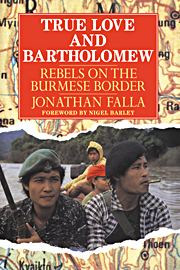Book contents
- Frontmatter
- Contents
- List of illustrations
- Foreword
- Preface
- Acknowledgments
- 1 A bronze drum
- 2 Boar Tusk's children
- 3 White collar Flowerland
- 4 True Love at home
- 5 Water child, land child
- 6 A simple man
- 7 Fighting mean, fighting clean
- 8 Great Lake and the Elephant Man
- 9 Bartholomew's boarders
- 10 The three seasons
- Interlude: from the Kok river
- 11 Last of the longhouses
- 12 A delicate bamboo tongue
- 13 True Love in love
- 14 Fermented monkey faeces
- 15 Perfect hosts
- 16 Old guard, young Turks
- 17 True Love and White Rock
- 18 Insurgents in a landscape
- 19 True Love and sudden death
- 20 Portraits
- Notes
- Bibliography
- Index
2 - Boar Tusk's children
Published online by Cambridge University Press: 28 October 2009
- Frontmatter
- Contents
- List of illustrations
- Foreword
- Preface
- Acknowledgments
- 1 A bronze drum
- 2 Boar Tusk's children
- 3 White collar Flowerland
- 4 True Love at home
- 5 Water child, land child
- 6 A simple man
- 7 Fighting mean, fighting clean
- 8 Great Lake and the Elephant Man
- 9 Bartholomew's boarders
- 10 The three seasons
- Interlude: from the Kok river
- 11 Last of the longhouses
- 12 A delicate bamboo tongue
- 13 True Love in love
- 14 Fermented monkey faeces
- 15 Perfect hosts
- 16 Old guard, young Turks
- 17 True Love and White Rock
- 18 Insurgents in a landscape
- 19 True Love and sudden death
- 20 Portraits
- Notes
- Bibliography
- Index
Summary
In answer to the question, ‘Who is a Karen?’ one of the answers should be (1) one who can claim his ancestry to Toh Meh Pah and (2) one who possesses, maintains and cultivates the legacies bequeathed to him by the said forebear and his predecessors. The writer maintains that anyone who treasures and upholds these inheritances is a Karen though he may not have a drop of blood from this tribe.
Saw Moo Troo (1981, p. 1)I knew a ‘revolutionary teacher’ called Bastion. He was an educated, intelligent man who took the traditions seriously, and so I asked him if he'd tell me the story of Toh Meh Pah, the ancestral culture-hero of the Karen. A few days later we met on his verandah for a cigar and a recital:
THE STORY OF TOH MEH PAH
Once there were two brothers who lived and farmed together in the far north. In time, both married and raised large families, but they stayed living and farming close to one another.
One day a wild boar came and wrecked the rice fields. The elder brother, although sixty years old, pursued the boar through the forest and found its lair. The boar was rooting about nearby. The old man raised his spear and aimed for the pig's head, just where the long and lethally sharp tusks joined the skull on each cheek. He thrust forward with his spear which passed through the boar's head and pinned it to a tree. The animal was so big that the old man couldn't move it by himself, so he returned home and told his sons to go and fetch the carcase.
- Type
- Chapter
- Information
- True Love and BartholomewRebels on the Burmese Border, pp. 11 - 30Publisher: Cambridge University PressPrint publication year: 1991



